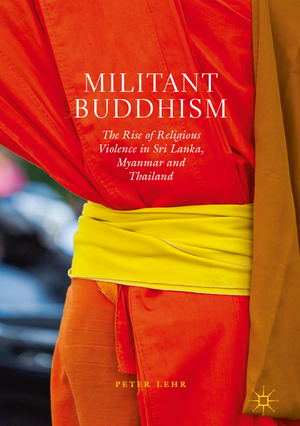Militant Buddhism: The Rise of Religious Violence in Sri Lanka, Myanmar and Thailand
Autor Peter Lehren Limba Engleză Hardback – 12 ian 2019
Preț: 644.30 lei
Preț vechi: 758.01 lei
-15% Nou
Puncte Express: 966
Preț estimativ în valută:
123.31€ • 128.24$ • 103.19£
123.31€ • 128.24$ • 103.19£
Carte tipărită la comandă
Livrare economică 14-28 martie
Preluare comenzi: 021 569.72.76
Specificații
ISBN-13: 9783030035167
ISBN-10: 3030035166
Pagini: 264
Ilustrații: VI, 306 p.
Dimensiuni: 148 x 210 x 20 mm
Greutate: 0.53 kg
Ediția:1st ed. 2019
Editura: Springer International Publishing
Colecția Palgrave Macmillan
Locul publicării:Cham, Switzerland
ISBN-10: 3030035166
Pagini: 264
Ilustrații: VI, 306 p.
Dimensiuni: 148 x 210 x 20 mm
Greutate: 0.53 kg
Ediția:1st ed. 2019
Editura: Springer International Publishing
Colecția Palgrave Macmillan
Locul publicării:Cham, Switzerland
Cuprins
1 Introduction: Between Dhamma-Ghosa and Bheri-Ghosa.- 2 The Sound of War Drums: Political Theology and the Return of Religion.- 3 The Age of Suffering: Buddhist Discourses on Non-Violence in Theory and Practice.- 4 Monks in the Age of Suffering: World Renouncers and World Conquerors.- 5 Sri Lanka: “This Is the Island of Us Sinhalese People".- 6 Burma: “You Cannot Sleep Next to a Mad Dog”.- 7 Thailand: “It Is Time to Arm Thai Buddhists”.- 8 Comparative Analysis: “Buddhism Is Not a Suicidal Utopianism”.- 9 Outlook: How to Deal with War Monks?.
Notă biografică
Peter Lehr is Lecturer in Terrorism Studies at the Centre for the Study of Terrorism and Political Violence (CSTPV), University of St. Andrews, UK. An area specialist on South and Southeast Asia, Dr Lehr has published on a wide range of topics, including religion and (political) violence.
Textul de pe ultima copertă
Against the backdrop of the ongoing Rohingya crisis, this book takes a close and detailed look at the rise of militant Buddhism in Sri Lanka, Burma and Thailand, and especially at the issues of ‘why’ and ‘how’ around it. We are well aware of Christian fundamentalism, militant Judaism and Islamist Salafism-Jihadism. Extremist and violent Buddhism however features only rarely in book-length studies on religion and political violence. Somehow, the very idea of Buddhist monks as the archetypical ‘world renouncers’ exhorting frenzied mobs to commit acts of violence against perceived ‘enemies of the religion’ seems to be outright ludicrous. Recent events in Myanmar/Burma, but also in Thailand and Sri Lanka, however indicate that a militant strand of Theravada Buddhism is on the rise. How can this rise be explained, and what role do monks play in that regard? These are the two broad questions that this book explores.
Peter Lehr is Lecturer in Terrorism Studies at the Centre for theStudy of Terrorism and Political Violence (CSTPV), University of St. Andrews, UK. An area specialist on South and Southeast Asia, Dr Lehr has published on a wide range of topics, including religion and (political) violence.
Peter Lehr is Lecturer in Terrorism Studies at the Centre for theStudy of Terrorism and Political Violence (CSTPV), University of St. Andrews, UK. An area specialist on South and Southeast Asia, Dr Lehr has published on a wide range of topics, including religion and (political) violence.
Caracteristici
Offers a comprehensive, comparative discussion of militant Buddhism in the three leading Theravadin countries Sri Lanka, Myanmar/Burma and Thailand Explores how a notionally non-violent religion explains and defends the recourse to violence Argues that militancy and (defensive) Buddhist violence is not a novel development or even a ‘modern distortion of the true religion’, but played a role ever since the first Buddhist kingdoms were established
